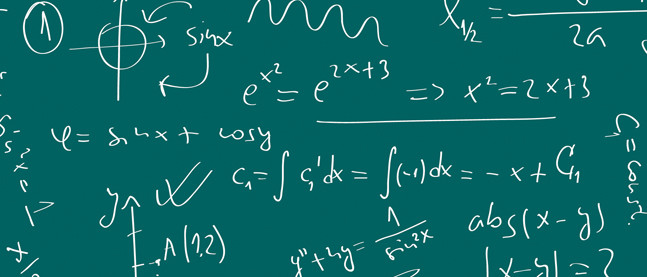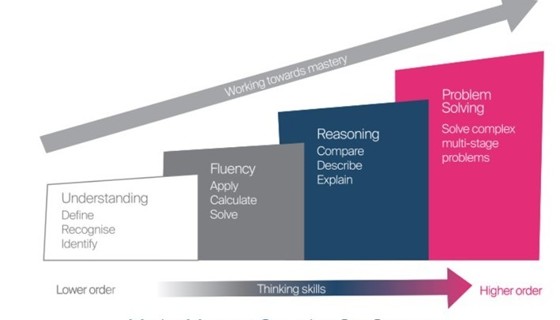Mathematics

Curriculum Statement: Mathematics
'Mathematics is the language in which God has written the Universe' Galileo Galilei
Curriculum Aims:
Our curriculum aims to inspire our pupils not only to develop their understanding of mathematics, but also to nurture a love for it. Mathematics reveals the patterns that let us understand the real world and so is essential to everyday life: critical to science, the foundation of technology, engineering and finance and is the bedrock of nature and creation. We are empowering our pupils and students so that they can improve not only their own lives, but can also better understand and engage with God’s world around them. In mathematics, we value the art of posing a question as well as solving it. Our passion stimulates the pupils and students to work with others, facilitating opportunities for leadership and teamwork. This universal language challenges thinking, feeds curiosity and enables our students to be collaborative and inquisitive throughout their education and life.
Curriculum Features:
Pupils are provided with opportunities to build on prior knowledge, make connections within and between topics, and apply their knowledge in different contexts. This enables pupils to explain, prove and justify their mathematical techniques and solutions. The department has worked together to develop a curriculum that covers all aspects of the National Curriculum as well as building in extension opportunities to allow pupils to develop their understanding. The scheme of work allows for opportunities to deepen cross- curricular links between our subject and the rest of the school. This also gives the pupils insight into the applications of maths in the working world and our day to day lives.
Our intake is varied in terms of attainment and our curriculum allows all pupils to access identified essential skills for each topic while providing this extension for those who are aiming higher.
Each topic is rigorously tested at two different points (mini test and Termly test) to ensure pupils’ understanding, give them chance to improve based on feedback and give an opportunity to evaluate teaching. Feedback to assessment allows pupils and staff in the department to have a dialogue which can further deepen understanding and does encourage the learning to be at a higher level.
These tests are reviewed and improved each time they are taken and pupils appreciate the opportunity to show their capabilities and address their misconceptions.
Students in Years 7 to 11 complete homework on the Sparx Maths Platform. Sparx personalises each child’s homework, creating a weekly set of questions tailored to their level of understanding and learning pace. The questions are designed to be achievable whilst offering the stretch that learners need to make progress.
Each week, topics are set by the maths teacher and make up the majority of the homework questions. Questions from previous topics are also be included in the homework so that students can keep practising the skills they have learned and consolidate their understanding.
Challenge is provided through depth rather than acceleration to ensure that mastery is achieved and students are not overloaded. All staff in the department are passionate about their subject and encourage the pupils to develop a love for what they are doing in the classroom. Deepening the pupils’ understanding is paramount to evoking a passion for maths.
The maths department is committed to working with pupils, colleagues, parents and guardians to remove barriers to success, enabling students to reach their full potential.
Co-Curricular Experiences:
KS3 pupils are encouraged to develop their fluency in numerical skills by use of programmes such as TT Rockstars both in class and independently.
Pupils are offered a variety of opportunities including KS3 maths club, KS4 and KS5 support sessions and entry into the UKMT Maths Challenges. Having the opportunity to work with staff through these extra experiences allows for a further opportunity for pupils to live out our curriculum statement and develop resilience for when they don’t have the answer.
What follows is a current summary of the intended subject curriculum content in each year of the key stage. It highlights the key knowledge and skills intended for learning, and some of the ways progress in the curriculum is to be assessed. It clarifies the key questions students should be addressing and gives links to help students and families to develop this learning further.
KS3
Currently in year 7, 8 and 9, we follow a scheme of learning that is aligned with the White Rose scheme. This scheme of learning covers all the National Curriculum, while helping pupils to develop their understanding and mastery of topics. It enables us to offer a continuity from KS2 in terms of methods and approach. The pedagogy of White Rose Maths focuses on learning by questioning which builds students’ knowledge to expand their understanding - this diagram from their website explains students’ pedagogical progression:

In order to implement this structure, during Year 7 we transition to a top set and support set in the two halves of the year, with the other classes in mixed ability to enable each student to develop to their full mathematical potential. In year 8, both sides of the year group are banded. This allows teaching to be adapted to the needs of the students, ensuring that students who learn mathematics more slowly than their peers are not rushed through the study of new content, and that students who learn more quickly are provided with adequate stretch and within lessons.
In lessons, we use a wide range of materials and resources to challenge and enhance students’ mathematical knowledge appropriate to their ability and we will always encourage the skills of good mathematical communication. The material is delivered as a mixture of abstract mathematical principles and concrete problem solving.
Finally, to promote fluent numeracy, we use Times Table Rock Stars website as a medium to engage students and strengthen their numerical skills. We involve tutor teams to create “Times table “battles” and have year group competitions once a half-term.
In Year 9, the two sides of the year are taught together in single stream of 9 banded groups
KS4
Building on their knowledge from KS3, students formally begin their GCSE studies at the start of Year 9 10. The curriculum continues to be aligned with White Rose developing learning in ‘small steps’ to allow pupils to find the links to other topics and to gain the fuller understanding and problem solving skills that the current Edexcel GCSE requires. All pupils follow the same learning programme since it has extension and support built in throughout and the final decision on tier of entry is not taken until after the March mocks in Year 11.
Pupils in top group also have the opportunity to study for the Edexcel Level 3 Algebra qualification. This is an excellent course which stretches our most able students We also offer two courses to our students who require extra support. These are the Edexcel Number and Measure Award, at Levels 1 and 2, and the Entry Level Certificate in Mathematics, also through Edexcel.
Pupils in top set also have the opportunity to study for the Edexcel Level 3 Algebra qualification. This is an excellent course which stretches our most able students We also offer two courses to support our weaker pupils. These are the Edexcel Number and Measure Award, at Levels 1 and 2, and the Entry Level Certificate in Mathematics, also through Edexcel.
Edexcel Number and Measure award
KS5
A Level Mathematics is a popular subject for Year 12 students. Students follow the OCR specification A. Students take their A Level exams at the end of Year 13, with a few sitting AS papers in Year 12. We also offer OCR Further Maths at A Level, pupils who take this option complete the A Level Maths course in year 12, followed by the Further Maths course in year 13. The examinations for both courses are taken at the end of year 13.
We also offer the AQA Level 3 Certificate in Mathematical Studies for those students who do not achieve at least grade 7 in their GCSE Mathematics examinations, but wish to continue their mathematical studies. For those who achieve below grade 4 at GCSE Level we provide the opportunity to carry on their studies at this level in order to achieve a higher grade.
Resources
The links below are a resource with a sets of five questions for every day. It is based on the idea that “little and often” helps improve maths performance.
There are five levels, so you can choose the most appropriate one for your child and answers are available on the website. Please ask your child to see their maths teacher for guidance if they are unsure on any question.
Numeracy 5aday – Broadly designed for KS4 students aiming for Grades 1, 2 and 3. This is also good practice for KS3 students.
Foundation – Broadly designed for KS4 students aiming for Grades 3 and 4. This would be a good challenge for KS3 students
Foundation Plus – Broadly designed for KS4 students aiming for Grades 4, 5 and 6.
Higher – Broadly designed for KS4 students aiming for Grades 6 and 7.
Higher Plus – Broadly designed for KS4 students aiming for Grades 8 and 9.



